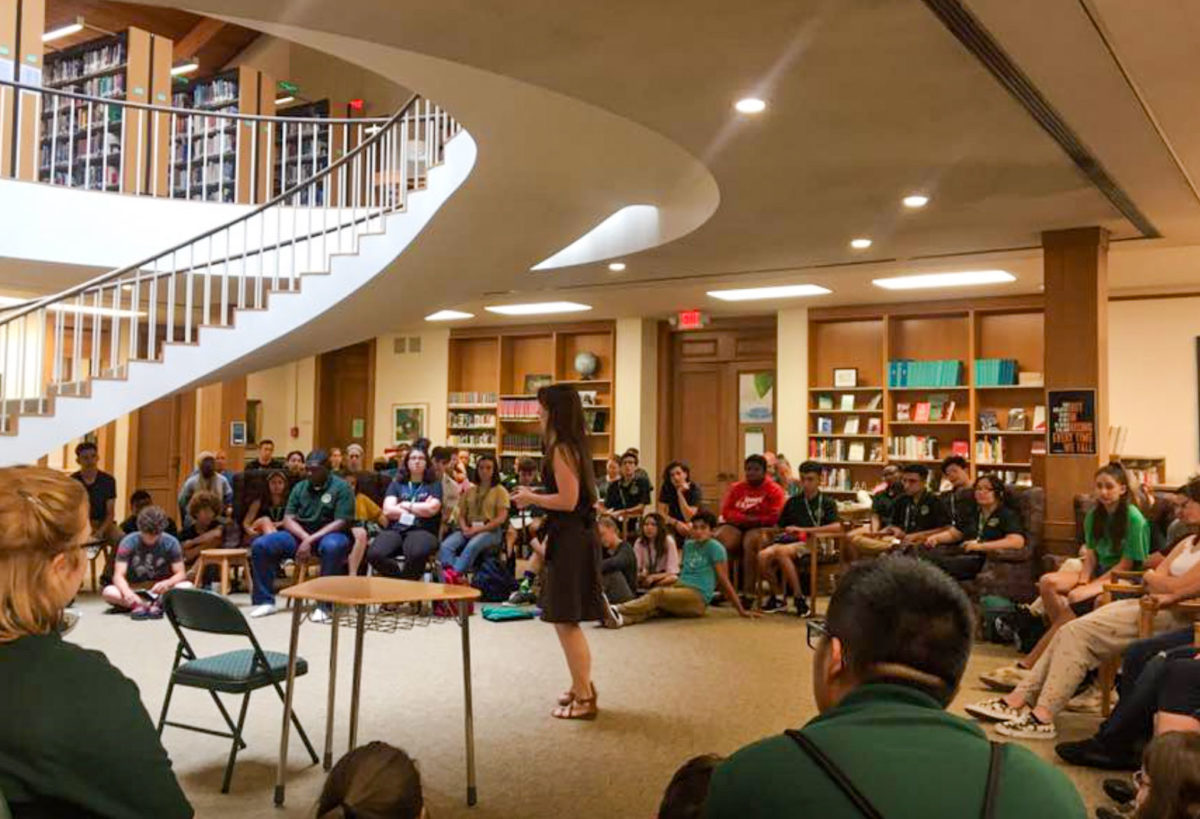Messy. Arguments. Presidential debates. Bickering. Back-and-forth. Ugly. All words that my peers and I responded with when Ms. April Lawson asked us what we believed debates were like. She soon reassured us that our debates during our time here would be nothing like that. In fact, they were just an intellectual conversation.
This is what Ms. Lawson and Mr. David Blackenhorn are working to fix. If we as intellectuals can not express ourselves and our opinions eloquently, how can we expect to do so when we are older and are in many governmental positions? This is one of the reasons Mr. Blankenhorn created Better Angels, to help people with different backgrounds and different views to find common ground on a controversial topic, peacefully and respectfully. Through this style of parliamentary debate, everything is addressed to the Chair, who serves as a medium between the speaker and the body or questioner, so as to discourage personal accusations and menacing tones. By keeping reactivity out of the equation, participants have the ability to present their opinions with raw emotion and not fear an attack from the body. Better Angels encourages debaters to speak their truth, but to also listen to what everyone has to say because one would never know what they can walk away with!
Our first debate with Ms. Lawson included the entire camp. Through a series of votes and checking split (seeing how many participants were for each side), we chose to debate resolved: abolish ICE. Students, TAs, and teachers all participated in this highly controversial debate. Participants were also actively engaged in asking the speakers questions if they themselves did not have the opportunity or did not want to speak. Beginning with an affirmative speech, people shared their opinions for both sides, using facts, personal stories, analogies, and more. Some participants even changed their mind about the topic over the course of the debate! Ms. Lawson stressed, however, that this was a good thing. Changing one’s mind does not make them indecisive. In fact, it shows that by listening to what others had to say, they learned new facts that made them think a little more about their stance, leading them to support the other side. It takes a lot of skill to change someone’s mind, but in this style of debate, everyone is able to speak with raw emotion and share their deepest opinions on the matter. Better Angels debates encourage this, as the best debating happens when people can speak their mind without fear of being shut down.
About a week later, Ms. Lawson came back, joined by Mr. David Blankenhorn. He spoke to us about the beginnings of Better Angels before we launched into our second all camp debate. Through the same voting process, we chose to debate resolved: abolish the death penalty. Because a class already debated this, there was a little bit of backlash to choosing this topic, but Ms. Lawson assured that the debate would go in a different direction because of the larger and new pool of participants. True to her word, the students agreed that though some of the basic points were touched, the conversation took a very different path, and looked at new facets of the topic. Many people participated, including Mr. Blankenhorn! As with every debate, we have a debrief at the end. Though this debate was just as passionate as the others, many people were dismayed that they did not have the opportunity to speak, myself included.
However, it is these exact debates and topics that do not bring strife between people, but bring us closer together. After both debates, students did not just merely leave the library to discuss everyday things or mad at each other. On the contrary, groups and pairs left the library, discussing their views if they did not have the opportunity to speak, or continue the discussion outside of the debate. Though the silly little stylistic rules did not apply anymore, the students continued to debate the topic in a respectful manner, keeping an open mind to whatever another student had to say. I can easily say that I am proud of our camp for always keeping objectivity in controversial discussions whether it be in a debate or just everyday conversation, something that I hope we can bring back to our communities once this camp is over. It is up to us as educated individuals to educate our communities, promote civil discourse, and be the change to depolarize America.
